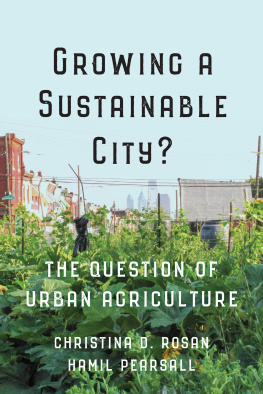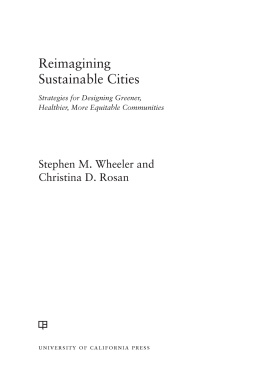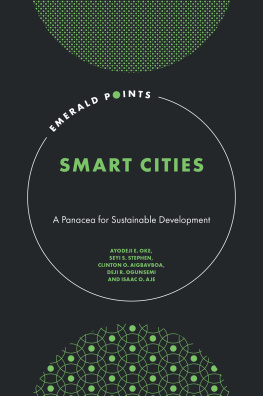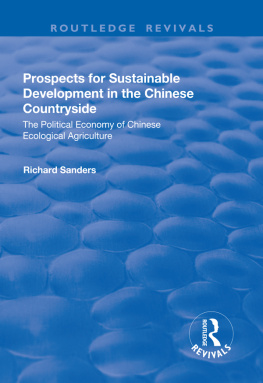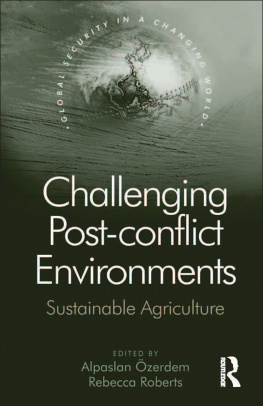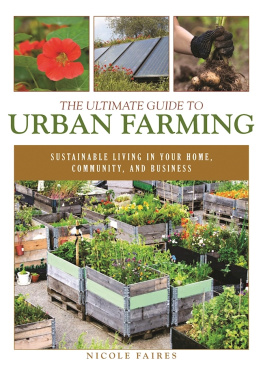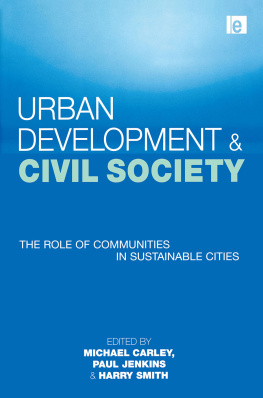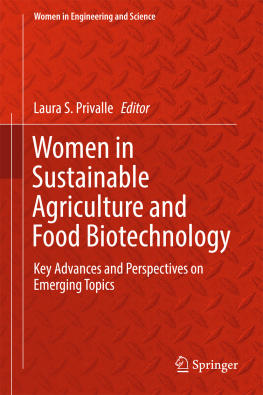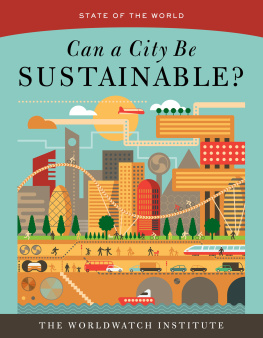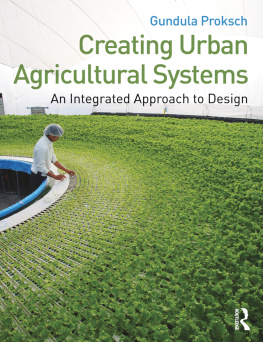Rosan - Growing A Sustainable City?: The Question Of Urban Agriculture
Here you can read online Rosan - Growing A Sustainable City?: The Question Of Urban Agriculture full text of the book (entire story) in english for free. Download pdf and epub, get meaning, cover and reviews about this ebook. year: 2018, publisher: University of Toronto Press, genre: Politics. Description of the work, (preface) as well as reviews are available. Best literature library LitArk.com created for fans of good reading and offers a wide selection of genres:
Romance novel
Science fiction
Adventure
Detective
Science
History
Home and family
Prose
Art
Politics
Computer
Non-fiction
Religion
Business
Children
Humor
Choose a favorite category and find really read worthwhile books. Enjoy immersion in the world of imagination, feel the emotions of the characters or learn something new for yourself, make an fascinating discovery.
- Book:Growing A Sustainable City?: The Question Of Urban Agriculture
- Author:
- Publisher:University of Toronto Press
- Genre:
- Year:2018
- Rating:3 / 5
- Favourites:Add to favourites
- Your mark:
- 60
- 1
- 2
- 3
- 4
- 5
Growing A Sustainable City?: The Question Of Urban Agriculture: summary, description and annotation
We offer to read an annotation, description, summary or preface (depends on what the author of the book "Growing A Sustainable City?: The Question Of Urban Agriculture" wrote himself). If you haven't found the necessary information about the book — write in the comments, we will try to find it.
Growing a Sustainable City? offers a critical analysis of the development of urban agriculture policies and their role in making post-industrial cities more sustainable.
Rosan: author's other books
Who wrote Growing A Sustainable City?: The Question Of Urban Agriculture? Find out the surname, the name of the author of the book and a list of all author's works by series.
Growing A Sustainable City?: The Question Of Urban Agriculture — read online for free the complete book (whole text) full work
Below is the text of the book, divided by pages. System saving the place of the last page read, allows you to conveniently read the book "Growing A Sustainable City?: The Question Of Urban Agriculture" online for free, without having to search again every time where you left off. Put a bookmark, and you can go to the page where you finished reading at any time.
Font size:
Interval:
Bookmark:

Urban agriculture offers promising solutions to many different urban problems, such as blighted vacant lots, food insecurity, storm water runoff, and unemployment. The objectives of urban agriculture connect to many cities broader goal of sustainability, but tensions among stakeholders have started to emerge as urban agriculture is incorporated into municipal policy-making frameworks.
Growing a Sustainable City? offers a critical analysis of the development of urban agriculture policies and their role in shaping post-industrial cities. Christina Rosan and Hamil Pearsalls case study of Philadelphia demonstrates how growing food in the city has become a symbol of urban economic revitalization, sustainability, and increasingly gentrification. Their research includes interviews with urban farmers, gardeners, and city officials, and reveals that the transition to sustainability is marked by a series of tensions along race, class, and generational lines. The book evaluates the role of urban agriculture in sustainability planning and policy by placing it within the context of a large North American city struggling to manage competing environmental and economic objectives. While highlighting the challenges and opportunities of institutionalizing urban agriculture into formal city policy, Growing a Sustainable City? tells the story of a citys growing pains as it attempts to reinvent itself as a green, attractive, and prosperous place to live.
(UTP Insights)
CHRISTINA D. ROSAN is an associate professor in the Department of Geography and Urban Studies at Temple University.
HAMIL PEARSALL is an assistant professor in the Department of Geography and Urban Studies at Temple University.

UTP Insights is an innovative collection of brief books offering accessible introductions to the ideas that shape our world. Each volume in the series focuses on a contemporary issue, offering a fresh perspective anchored in scholarship. Spanning a broad range of disciplines in the social sciences and humanities, the books in the UTP Insights series contribute to public discourse and debate and provide a valuable resource for instructors and students.
BOOKS IN THE SERIES
Christina D. Rosan and Hamil Pearsall, Growing a Sustainable City? The Question of Urban Agriculture
John Joe Schlichtman, Jason Patch, and Marc Lamont Hill, Gentrifier
Robert Chernomas and Ian Hudson, Economics in the Twenty-First Century: A Critical Perspective
Stephen M. Saideman, Adapting in the Dust: Lessons Learned from Canada's War in Afghanistan
Michael R. Marrus, Lessons of the Holocaust
Roland Paris and Taylor Owen (eds.), The World Wont Wait: Why Canada Needs to Rethink its International Policies
Bessma Momani, Arab Dawn: Arab Youth and the Demographic Dividend They Will Bring
William Watson, The Inequality Trap: Fighting Capitalism Instead of Poverty
Phil Ryan, After the New Atheist Debate
Paul Evans, Engaging China: Myth, Aspiration, and Strategy in Canadian Policy from Trudeau to Harper
The Question of Urban Agriculture
Christina D. Rosan and Hamil Pearsall
University of Toronto Press
Toronto Buffalo London
University of Toronto Press 2017
Toronto Buffalo London
www.utorontopress.com
Printed in the U.S.A
ISBN 978-1-4426-5061-9 (cloth) ISBN 978-1-4426-2855-7 (paper)

Printed on acid-free, 100% post-consumer recycled paper with vegetable-based inks.
Library and Archives Canada Cataloguing in Publication
Rosan, Christina, author
Growing a sustainable city? : the question of urban agriculture / Christina D. Rosan and Hamil Pearsall.
(UTP insights)
Includes bibliographical references and index.
ISBN 978-1-4426-5061-9 (hardcover). ISBN 978-1-4426-2855-7 (softcover)
1. Urban agriculture. 2. Urban agriculture Pennsylvania Philadelphia Case studies. 3. Sustainable agriculture. 4. Sustainable agriculture Pennsylvania Philadelphia Case studies. 5. Sustainable urban development. 6. Sustainable urban development Pennsylvania Philadelphia Case studies. 7. City planning. 8. City planning Pennsylvania Philadelphia Case studies. I. Pearsall, Hamil, 1981, author II. Title. III. Series: UTP insights
S494.5.U72R67 2017630.9173'2C2017-904603-9
University of Toronto Press acknowledges the financial assistance to its publishing program of the Canada Council for the Arts and the Ontario Arts Council, an agency of the Government of Ontario.

For Robert Mason
In Philadelphia, a city that two-term mayor Michael Nutter promised to make the Greenest City in America when he was inaugurated in 2008, the excitement over urban agriculture is ubiquitous. They are excited about the possibilities.
The urban agriculture bandwagon in cities is full steam ahead, and urban agriculture is increasingly viewed as an integral component of a sustainable city. This is true for global cities like San Francisco, New York, Vancouver, and London as well as post-industrial cities like Detroit, Cleveland, and Philadelphia that are still working to redefine themselves. Activists who believe in the transformative power of urban agriculture are making their voices heard to ensure that it is connected to the urban sustainability agenda. And the promises are big. It is difficult to attend an urban sustainability event in Philadelphia without hearing about the potential of urban agriculture for addressing blight, revitalizing communities, improving food security in underserved neighbourhoods, mitigating stormwater run-off, and providing valuable youth engagement opportunities. Much of the rhetoric lauds urban agriculture and the benefits it brings. A growing body of academic literature on urban agriculture has also supported this positive view of it ().
Scholars, planners, and policy-makers have embraced the potential of urban agriculture in its many forms (e.g., community gardens, urban farms), viewing it as a mechanism for promoting long-term economic development, community revitalization, and social and environmental health. For instance, , 34).
While much of the research on urban agriculture focuses on its benefits, some scholars have brought a critical perspective to urban gardening as well as to alternative food movements that seek to address inequities in food systems and food accessibility through farmers markets, community gardens, and other ways to deliver food to underserved communities ().
These critical food scholars have focused on the politics of urban food production; less attention has been devoted to the land use politics surrounding the formalization of alternative food provision specifically urban agriculture within planning and policy-making. We argue that this is an important area of inquiry that needs to be more closely examined since cities around the world are grappling with how to integrate urban agriculture into their policy and planning frameworks. As of the early 2000s, only a few cities in North America had institutionalized urban agriculture as a long-term policy solution (). But despite the growing acknowledgment of urban agriculture as an accepted land use, figuring out how to formally integrate urban agriculture into planning and urban development policies, and how to do so while addressing issues of equity and social justice, is a relatively new task.
Font size:
Interval:
Bookmark:
Similar books «Growing A Sustainable City?: The Question Of Urban Agriculture»
Look at similar books to Growing A Sustainable City?: The Question Of Urban Agriculture. We have selected literature similar in name and meaning in the hope of providing readers with more options to find new, interesting, not yet read works.
Discussion, reviews of the book Growing A Sustainable City?: The Question Of Urban Agriculture and just readers' own opinions. Leave your comments, write what you think about the work, its meaning or the main characters. Specify what exactly you liked and what you didn't like, and why you think so.

